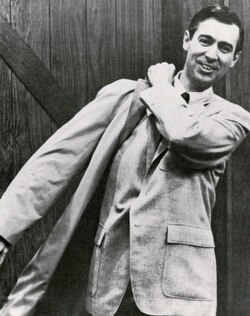Fred Rogers
| Fred Rogers | |
|---|---|

Fred Rogers, late 1960s
|
|
| Born |
Fred McFeely Rogers March 20, 1928 Latrobe, Pennsylvania, U.S. |
| Died | February 27, 2003 (aged 74) Pittsburgh, Pennsylvania, U.S. |
| Cause of death | Stomach cancer |
| Other names | Mister Rogers Mr. Rogers |
| Alma mater |
Dartmouth College (attended) Rollins College (B.A.) Pittsburgh Theological Seminary (M.Div.) |
| Occupation | Television personality |
| Years active | 1951–2001 |
| Spouse(s) | Sara Byrd (m. 1952; his death 2003) |
| Children | 2 |
| Signature | |
|
|
Fred McFeely Rogers (March 20, 1928 – February 27, 2003) was an American television personality, famous for creating, hosting, and composing the theme music for the educational preschool television series Mister Rogers' Neighborhood (1968–2001), which featured his kind-hearted, gentle, soft-spoken personality, and directness to his audiences.
Initially educated to be a minister, Rogers was displeased with the way television addressed children and made an effort to change this when he began to write for and perform on local Pittsburgh-area shows dedicated to youth. WQED developed his own show in 1968 and it was distributed nationwide by Eastern Educational Television Network. Over the course of three decades on television, Fred Rogers became an icon of American children's entertainment and education. He was also known for his advocacy of various public causes. His testimony before a lower court in favor of fair use recording of television shows to play at another time (now known as time shifting) was cited in a U.S. Supreme Court decision on the Betamax case, and he gave now-famous testimony to a U.S. Senate committee, advocating government funding for children's television.
Rogers received the Presidential Medal of Freedom, some forty honorary degrees, and a Peabody Award. He was inducted into the Television Hall of Fame, was recognized by two Congressional resolutions, and was ranked No. 35 among TV Guide's Fifty Greatest TV Stars of All Time. Several buildings and artworks in Pennsylvania are dedicated to his memory, and the Smithsonian Institution displays one of his trademark sweaters as a "Treasure of American History".
...
Wikipedia
